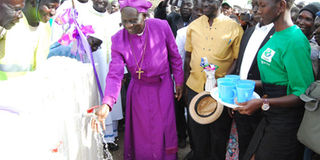Residents get clean water source

Launch. Madi and West Nile Diocese Bishop Charles Collins Andaku Centre commissions the water project at Maraju Village on Sunday. PHOTO BY FELIX WAROM OKELLO
What you need to know:
- The programme officer for RICE-WN, Mr Charles Afayo, said: “We lobbied for a water project because the people did not have clean water. It is not only for domestic use but it has components of irrigation where the farmers will be using it to increase agricultural production.”
Arua. Residents of Maraju, Alia and Orivu villages in Arua District have for decades gone without safe water sources, putting their lives at risk.
Others were sharing the limited water sources with animals.
The good news is that last Sunday, a water project was commissioned to extend piped water to the three affected villages.
The Erekpea Water for Production Scheme was constructed by Rural Initiative for Community Empowerment (RICE-WN) with funding from Walter Solbach Metallbau (WSM) and lobbying from the RICE Executive Director, Mr Pax Sakari.
Speaking to Daily Monitor in an interview on Sunday, Ms Tashila Amaniyo, a resident of Maraju Village in Alia Parish, Aiivu Sub-county in Terego County, Arua District, said residents had to trek long distances in search of clean water and would be exposed to risks including dangerous animals that move at night.
Challenges
“We have been suffering due to lack of access to clean water. We would wake up very early morning and late at night to fetch water from the river which is very far,” Ms Amaniyo said.
“We have had scenarios where we have shared water sources with animals. You have to first chase away the animals before drawing the water,” she added
The community has been fetching water from Bechumu, Ozua and Lokia seasonal wells.
The locals said during dry spells, desperate people would trek to River Enyau that is about six kilometres away from the villages.
“This water project will reduce the disease burden we have been exposed to for a long time. Diseases such as typhoid, diarrhea and other waterborne infections will be reduced,” Ms Amaniyo added.
She said the water crisis had contributed to domestic violence since they spend longer hours at the wells as they queue for water.
Ms Jane Yamandu, 36, a resident, hailed the donors for the initiative she said comes in handy.
“Previously, in the worst case scenario is that we have been sharing water with animals. Clean and safe water has been a nightmare for us for decades yet the government has not come to our rescue,” she said.
The programme officer for RICE-WN, Mr Charles Afayo, said: “We lobbied for a water project because the people did not have clean water. It is not only for domestic use but it has components of irrigation where the farmers will be using it to increase agricultural production.”
The district water officer for Arua, Mr Stephen Obitre, said having clean water is a right and not a privilege.
He also said the water source will reduce on disease outbreak in the area.
“The provision of this clean water will reduce disease burden, walking long distances and time spent at water points. In the district, about 37 per cent of the population still consume unsafe water,” he said.
Benefits
Each village will have easily accessible fetching points to cut shot the long distances.
The nearest water point was about two kilometres even when a borehole was constructed in 2007 in the area to serve about 800 people.
The gravity water scheme will be providing 50,000 cubic metres of water in a day from the 20,000-litre installed tanks and pumped from 20 solar panels that were installed.




